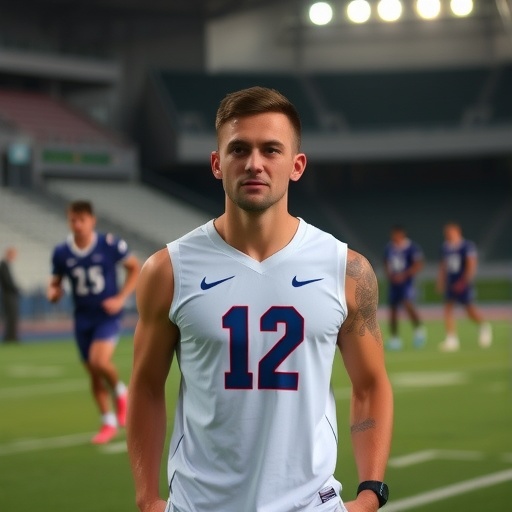In the high-stakes arena of elite athletics, mental resilience often distinguishes the champions from the rest. Renowned Olympic gymnast Simone Biles exemplifies this reality, embodying both the relentless pursuit of excellence and the psychological pressures that come with it. A recent study emerging from the Binghamton University School of Management sheds new light on how leadership styles within coaching can significantly influence an athlete’s mental toughness, pointing towards transformational leadership as a key mechanism.
Traditionally, coaches might resort to blunt or even harsh motivational tactics, such as making critical comments about an athlete’s physique or performance, hypothesizing that such remarks spur improvement. However, new research counters this notion by illuminating the adverse psychological effects these criticisms can wield. Instead, the study emphasizes that transformational leadership—an approach grounded in empowerment, shared vision, and individual growth—can strengthen athlete resilience more effectively than conventional methods.
Transformational leadership, extensively studied within organizational behavior, involves inspiring followers to transcend self-interest for the sake of collective goals. This leadership paradigm fosters intrinsic motivation by supporting autonomy, competence, and relatedness—the core components of self-determination theory. When adapted to sports coaching, such leadership not only motivates athletes but also cultivates a positive environment conducive to psychological growth and endurance under pressure.
The empirical foundation of the study is notable: researchers administered surveys to 301 volleyball players from Taiwan’s University Volleyball League, including both male and female athletes. By measuring athletes’ perceptions of their coaches’ leadership styles at the start of their season, and then assessing their mental toughness and relational dynamics after the season’s conclusion, the researchers traced the pathways through which transformational leadership exerted its influence.
A critical insight from the findings is the mediating role of a task-involving climate. This refers to an environment where effort, improvement, and mastery are emphasized rather than ego or social comparison. When coaches emphasize collective collaboration and individual progress, athletes perceive the climate as supportive and motivating, which in turn bolsters their mental toughness. This is juxtaposed against ego-involving climates, which can foster anxiety and undermine resilience.
Equally important is the quality of the coach-athlete relationship, which the study identifies as a second mediating mechanism. Trust, communication, and mutual respect within this dyad produce psychological resources that help athletes manage the inherent stress and adversity of competitive sports. Such relational dynamics empower athletes by attending to their unique challenges and tailoring support to individual needs, rather than enforcing a uniform motivational code.
Practical applications of this research suggest that coaches should prioritize individualized feedback rather than generic praise or criticism. Setting personalized goals based on an athlete’s capabilities helps cultivate intrinsic motivation, steering the focus away from detrimental comparisons. This nuanced approach acknowledges the athlete as a complex individual with specific psychological and emotional requirements.
Leadership in sports shares striking parallels with business leadership in the capacity to navigate disruptions and performance pressures. Just as companies must adapt swiftly to market changes, sports teams regularly recalibrate strategies and roles to optimize success. Transformational coaches function as change agents within this context, orchestrating both team unity and individual development to sustain high performance.
The study’s co-author, Chou-Yu (Joey) Tsai, an Osterhout Associate Professor of Entrepreneurship at Binghamton University, underscores that the cultivation of mental toughness is contingent upon such sophisticated leadership frameworks. Mental toughness is not innate but forged through careful relational and environmental scaffolding, a paradigm shift that can revolutionize coaching practices across sports disciplines.
Furthermore, the integration of self-determination theory and transformational leadership in this context offers a theoretical synthesis with powerful implications for psychological interventions in sports. By fostering athletes’ autonomy, competence, and relatedness, transformational coaches contribute to psychological well-being alongside performance metrics, addressing the holistic needs of athletes.
This research, published in the International Journal of Sports Science & Coaching, offers a robust foundation for further interdisciplinary inquiries. It bridges organizational psychology, sports science, and education, suggesting that leadership development programs for coaches could benefit from incorporating transformational leadership principles for maximal psychological and competitive outcomes.
In an era where mental health and athlete well-being are increasingly spotlighted, this study presents a compelling argument for a paradigm shift in coaching: from motivation through criticism and fear to inspiration through individualized empowerment and relationship building. Such a shift not only enhances mental toughness but may also cultivate sustainable athletic careers marked by resilience and psychological flourishing.
Subject of Research: People
Article Title: Effects of transformational coaches on athlete mental toughness: Dual mediating roles of task-involving climate perception and coach-athlete relationship
News Publication Date: 3-Oct-2025
Web References: http://dx.doi.org/10.1177/17479541251380718
References: International Journal of Sports Science & Coaching
Image Credits: Jonathan Cohen
Keywords: Sports; Educational methods




